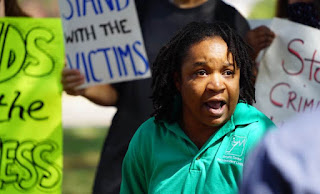Memphis issues often leave people with disabilities without equal access
By Allison Donald
The availability of affordable accessible housing was front and center as Habitat for Humanity of Greater Memphis hosted a panel discussion at the National Civil Rights Museum about the Fair Housing Act 50 years later and its impact going forward.
In Memphis a two-bedroom apartment on average is about $864.00 dollars. If you are a person with a disability that relies on Supplemental Security Income benefits as your sole income $735.00 a month you cannot afford to live in a decent apartment in this city. Also, it may be impossible to meet the rental criteria for the apartment complex which requires 3 times the rent that leaves people with disabilities and individuals with lower incomes out of the housing and rental market as well.
“How are we going to preserve the beloved communities?” Asked David Bowers the Vice President and Mid-Atlantic market leader. “This is the question that is at the center of these new developments that have sprung up in these under-developed and under-performing neighborhoods.”
The beloved communities are being dismantled by incentivizing its residents to move out with vouchers and forcing those individuals who are renting out, because they can’t afford to live there anymore.
“Who are we building these new communities for?” Asked Dr. Christopher Herbert a panelist and the managing director of the Joint Center for Housing Studies at Harvard. “African American, elderly, and the disabled are being moved out of these communities in favor of a white, more affluent population.”
“Only about ten percent of the displaced residents are able to return to their neighborhood,” said Dr. Kathryn Edin a panelist who is a professor of Sociology and Public Affairs at the Woodrow Wilson School at Princeton University, “once redevelopment starts.”
Dr. Edin points out that the safety nets that are supposed to protect families and individuals who are deemed vulnerable (people with disabilities) are non-existent, due in part to low wages and the fact that policies that have been put in place to protect have not worked. It has definitely had an effect on the way people with disabilities search for housing in Memphis.
Often times housing searches are limited to high rises and income based housing which may not be in the most desirable neighborhoods, or kept in the best living conditions.
As a result of this influx of activity displacement the poor many of those who are often people with disabilities has become a larger issue in cities like Memphis.
“It is important to understand policy like the Fair Housing Act and how it affects equity in housing and sustainable communities,” said Kalima Rose a panelist and Vice President of Strategic Initiatives at PolicyInk stated. “It is the most crucial task ahead when trying to create more inclusive cities and neighborhoods with resources for transportation, housing, and other amenities that can meet the needs of all its citizens both non-disabled and disabled.”



No comments:
Post a Comment